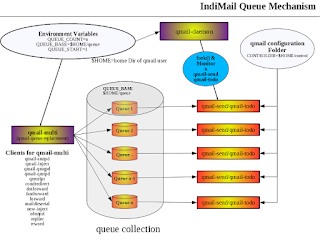Some of these environment variables can be set during the startup of various services. IndiMail has all its services configured as directories in the /service directory. As an example, if you want to force authenticated SMTP on all your users, setting the environment variable REQUIREAUTH allows you to do so.
% su
# echo 1 >
/service/qmail-smtpd.587/variables/REQUIREAUTH
# svc -d
/service/qmail-smtpd.587
# svc -u
/service/qmail-smtpd.587
sets the qmail-smtpd running on port 587 to force authentication.
Setting environment variables in your startup script, in your .profile or your shell forces you to permanently set the environment variable to a specific value. Using envrules, IndiMail allows you to set these environment variables specific to different senders or recipients. envrules allows IndiMail platform to be tuned differently for different users. No other messaging platform, to the best of my knowledge, is capable of doing that. Another way of saying is that envrules allows your IndiMail platform to dynamically change its behavior for each and every user.
For the SMTP service, you can set different environment variables for different senders. All that is required is to define the following in the control file /etc/indimail/control/from.envrules. The format of this file is of the form
pattern:envar1=val,envar2=val,...]
where pattern is a regular expression which matches a sender. envar1, envar2 are list of environment variables to be set. If val is omitted, the environment variable is unset. The name of the control file can be overridden by the environment variable FROMRULES. e.g. having the following in from.envrules
*consultant:REQUIREAUTH=1,NORELAY=1
forces all users whose email ids end with 'consultant' to authenticate while sending mails. Also such users will be prevented from sending mails to outside your domain.
ceo@example.com:DATASIZE=
Removes all message size restrictions for the user whose email address is ceo@example.com, by unsetting the environment variable DATASIZE.
You can also set envrules on per recipient basis. This gets set for qmail-local & qmail-remote. The control file to be used in this case is /etc/indimail/control/rcpt.envrules. The filename can be overridden by RCPTRULES environment variable.
.e.g
*.yahoo.com:OUTGOINGIP=192.168.2.100
The OUTGOINGIP environment variable is used by qmail-remote to bind on a specific IP address when connecting to the remote SMTP server. The above envrule forces qmail-remote to use 192.168.2.100 as the outgoing IP address when sending mails to any recipient at yahoo.com.
For SMTP service the following the following list of environment variables can be modified using envrules
REQUIREAUTH, QREGEX, ENFORCE_FQDN_HELO, DATABYTES, BADHELOCHECK, BADHELO, BADHOST, BADHOSTCHECK, TCPPARANOID, NODNSCHECK, VIRUSCHECK, VIRUSFORWARD, REMOVEHEADERS, ENVHEADERS, LOGHEADERS, LOGHEADERFD, SIGNATURES, BODYCHECK, BADMAILFROM, BADMAILFROMPATTERNS, BOUNCEMAIL, CUGMAIL, MASQUERADE, BADRCPTTO, BADRCPTPATTERNS, GOODRCPTTO, GOODRCPTPATTERNS, GREYIP, GREETDELAY, CLIENTCA, TLSCIPHERS, SERVERCERT, BLACKHOLERCPT, BLACKHOLERCPTPATTERNS, SIGNKEY, SIGNKEYSTALE, SPFBEHAVIOR, TMPDIR, TARPITCOUNT, TARPITDELAY, MAXRECIPIENTS, MAX_RCPT_ERRCOUNT, AUTH_ALL, CHECKRELAY, CONTROLDIR, ANTISPOOFING, CHECKRECIPIENT, SPAMFILTER, LOGFILTER, SPAMFILTERARGS, SPAMEXITCODE, REJECTSPAM, SPAMREDIRECT, SPAMIGNORE, SPAMIGNOREPATTERNS, FILTERARGS, QUEUEDIR, QUEUE_BASE, QUEUE_START, QUEUE_COUNT, QMAILQUEUE, QUEUEPROG, RELAYCLIENT, QQEH, BADEXT, BADEXTPATTERNS, ACCESSLIST, EXTRAQUEUE, QUARANTINE, QHPSI, QHPSIMINSIZE, QHPSIMAXSIZE, QHPSIRC, QHPSIRN, USE_FSYNC, SCANCMD, PLUGINDIR, QUEUE_PLUGIN, PASSWORD_HASH, MAKESEEKABLE, MIN_FREE, ERROR_FD, DKSIGN, DKVERIFY, DKSIGNOPTIONS, DKQUEUE, DKEXCLUDEHEADERS, DKIMSIGN, DKIMVERIFY, DKIMPRACTICE, DKIMIDENTITY, DKIMEXPIRE, SIGN_PRACTICE DKIMQUEUE, SIGNATUREDOMAINS, and NOSIGNATUREDOMAINS
The following list of environment variables can be modified using envrules if QMAILLOCAL and QMAILREMOTE is set to /var/indimail/bin/spawn-filter.
QREGEX, SPAMFILTER, LOGFILTER, SPAMFILTERARGS, FILTERARGS, SPAMEXITCODE, HAMEXITCODE, UNSUREEXITCODE, REJECTSPAM, SPAMREDIRECT, SPAMIGNORE, SPAMIGNOREPATTERNS, DATABYTES, MDA, MYSQL_INIT_COMMAND, MYSQL_READ_DEFAULT_FILE, MYSQL_READ_DEFAULT_GROUP, MYSQL_OPT_CONNECT_TIMEOUT, MYSQL_OPT_READ_TIMEOUT, MYSQL_OPT_WRITE_TIMEOUT, QUEUEDIR, QUEUE_BASE, QUEUE_START, QUEUE_COUNT, and TMPDIR
The following list of environment variables which can be modified using envrules are specfic to qmail-remote.
CONTROLDIR, SMTPROUTE, SIGNKEY, OUTGOINGIP, DOMAINBINDINGS, AUTH_SMTP, MIN_PENALTY, and MAX_TOLERANCE
The following list of environment variables which can be modified using envrules are specfic to qmail-local.
USE_SYNCDIR, USE_FSYNC, and LOCALDOMAINS
Do
man qmail-smtpd(8),
spawn-filter(8)
to know the full list of environment variables that can be controlled
using envrules.

No comments:
Post a Comment